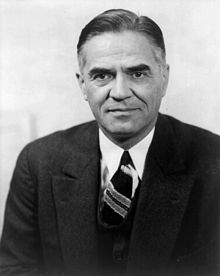Ralph A. Bard
| Ralph Austin Bard | |
|---|---|

Ralph Austin Bard
|
|
| Under Secretary of the Navy | |
|
In office 24 June 1944 – 30 June 1945 |
|
| President |
Franklin D. Roosevelt Harry S. Truman |
| Preceded by | James Forrestal |
| Succeeded by | Artemus Gates |
| Assistant Secretary of the Navy | |
|
In office 24 February 1941 – 24 June 1944 |
|
| President | Franklin D. Roosevelt |
| Preceded by | Lewis Compton |
| Succeeded by | H. Struve Hensel |
| Personal details | |
| Born |
July 29, 1884 Cleveland, Ohio |
| Died |
April 5, 1975 (aged 91) Deerfield, Illinois |
| Political party | Republican |
| Spouse(s) | Mary Hancock Spear |
| Alma mater | Princeton University |
| Occupation | financier |
| Signature |  |
Ralph Austin Bard (July 29, 1884 – April 5, 1975) was a Chicago financier who served as Assistant Secretary of the Navy, 1941–1944, and as Under Secretary, 1944–1945. He is noted for a memorandum he wrote to Secretary of War Henry L. Stimson in 1945 urging that Japan be given a warning before the use of the atomic bomb on a strategic city. He was "the only person known to have formally dissented from the use of the atomic bomb without advance warning."
Born in Cleveland, Ohio, Bard was the second of three children born to George Morris Bard (1852-1932) and Helen Norwood Bard (1858-1947). He went to Princeton University, where he lettered in baseball, basketball and football. After graduating in 1906, he embarked on a career as an investment banker in Chicago, eventually becoming head of his own firm. He married Mary Hancock Spear (1886-1949) in 1909. They had four children. Bard was active in civic organizations in the Chicago area, including Boy Scouts of America and the American Red Cross. He was also a trustee of Northwestern University.
Although he was an active Republican, Bard was appointed Assistant Secretary of the Navy by President Franklin D. Roosevelt, a Democrat who had once held the same post. As Assistant Secretary, Bard was responsible for all matters relating to civilian personnel and the general administration of the Navy Department. Divisions under his control included Shore Establishments, Transportation, Supervision and Management, the Administrative Office, and the Management Engineer's Office. He instituted a sweeping industrial relations program, covering such areas as training, classification, safety, labor relations, recruiting, and efficient use of manpower, and established a Personnel Relations Division in every major naval activity. As a result of his efforts, there was no strike or work stoppage at any Navy activity during World War II. Bard was also a member of the War Manpower Commission, established by President Roosevelt to balance the wartime labor needs of the civilian and military sectors of the U.S. economy. Upon becoming Under Secretary on June 24, 1944, Bard added responsibility for all Navy uniformed personnel to his other duties. Bard also served as acting Secretary of the Navy from April 28, 1944 to May 19, 1944, following the death of Secretary Frank Knox.
...
Wikipedia
